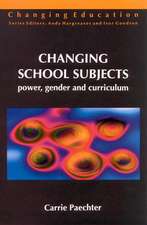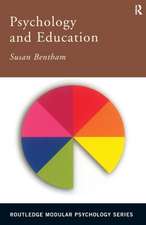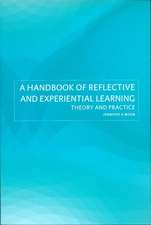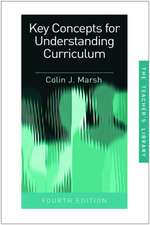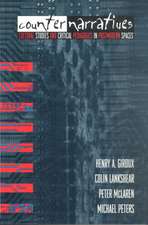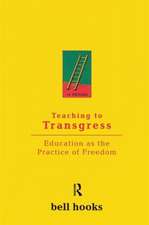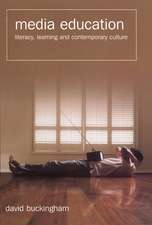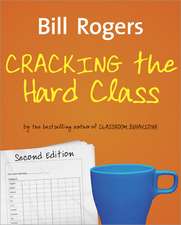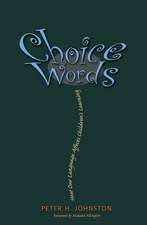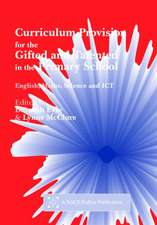Constructivist Instruction: Success or Failure?
Editat de Sigmund Tobias, Thomas M. Duffyen Limba Engleză Paperback – apr 2009
- the evidence for and against constructivism;
- the challenges from information-processing theorists; and
- commentaries from leading researchers in areas such as text comprehension, technology, as well as math and science education, who discuss the constructivist framework from their perspectives.
| Toate formatele și edițiile | Preț | Express |
|---|---|---|
| Paperback (1) | 482.10 lei 6-8 săpt. | |
| Taylor & Francis – apr 2009 | 482.10 lei 6-8 săpt. | |
| Hardback (1) | 1341.85 lei 6-8 săpt. | |
| Taylor & Francis – 23 mar 2009 | 1341.85 lei 6-8 săpt. |
Preț: 482.10 lei
Preț vechi: 567.17 lei
-15% Nou
Puncte Express: 723
Preț estimativ în valută:
92.27€ • 96.07$ • 77.97£
92.27€ • 96.07$ • 77.97£
Carte tipărită la comandă
Livrare economică 07-21 martie
Preluare comenzi: 021 569.72.76
Specificații
ISBN-13: 9780415994248
ISBN-10: 0415994241
Pagini: 392
Ilustrații: 3 black & white tables
Dimensiuni: 152 x 229 x 23 mm
Greutate: 0.73 kg
Ediția:1
Editura: Taylor & Francis
Colecția Routledge
Locul publicării:Oxford, United Kingdom
ISBN-10: 0415994241
Pagini: 392
Ilustrații: 3 black & white tables
Dimensiuni: 152 x 229 x 23 mm
Greutate: 0.73 kg
Ediția:1
Editura: Taylor & Francis
Colecția Routledge
Locul publicării:Oxford, United Kingdom
Cuprins
Foreword, Robert J. Sternberg
Preface
Part I. Introduction
Chapter 1. The Success or Failure of Constructivist Instruction: An Introduction
Sigmund Tobias and Timothy M. Duffy
Part II. The Evidence for Constructivism
Chapter 2. Reconciling a Human Cognitive Architecture
David Jonassen
Chapter 3. Constructivism in an Age of Non-Constructivist Assessments
Daniel L. Schwartz, Robb Lindgren, and Sarah Lewis
Chapter 4. Taking Guided Learning Theory to School: Reconciling the Cognitive, Motivational, and Social Contexts of Instruction
Phillip Herman and Louis M. Gomez
Chapter 5. Beyond More Versus Less: A Reframing of the Debate on Instructional Guidance
Alyssa Friend Wise and Kevin O’Neill
Chapter 6. Constructivism: When It's the Wrong Idea and When It's the Only Idea
Rand J. Spiro and Michael DeSchryver
Part III. Challenges to the Constructivist View
Chapter 7. What Human Cognitive Architecture Tells Us About Constructivism
John Sweller
Chapter 8. Epistemology or Pedagogy, That Is the Question
Paul A. Kirschner
Chapter 9. How Much and What Type of Guidance is Optimal for Learning?
Richard E. Clark
Chapter 10. Constructivism as a Theory of Learning Versus Constructivism as a Prescription for Instruction.
Richard E. Mayer
Chapter 11. The Empirical Support for Direct Instruction
Barak Rosenshine
Part IV. An Examination of Specific Learning and Motivational Issues
Chapter 12. Learning and Constructivism
Walter Kintsch
Chapter 13. From Behaviorism to Constructivism: A Philosophical Journey from Drill and Practice to Situated Learning
J. D. Fletcher
Chapter 14. What’s Worth Knowing about Mathematics?
Melissa Sommerfeld Gresalfi and Frank Lester
Chapter 15. "To every thing there is a season, and a time to every purpose under the heavens" What about Direct Instruction?
David Klahr
Chapter 16. Beyond the Fringe: Building and Evaluating Scientific Knowledge Systems
Richard A. Duschl and Ravit Golan Duncan
Part V. Summing Up
Chapter 17. An Eclectic Appraisal of the Success or Failure of Constructivist Instruction
Sigmund Tobias
Chapter 18. Building Lines of Communication and a Research Agenda
Thomas M. Duffy
Preface
Part I. Introduction
Chapter 1. The Success or Failure of Constructivist Instruction: An Introduction
Sigmund Tobias and Timothy M. Duffy
Part II. The Evidence for Constructivism
Chapter 2. Reconciling a Human Cognitive Architecture
David Jonassen
Chapter 3. Constructivism in an Age of Non-Constructivist Assessments
Daniel L. Schwartz, Robb Lindgren, and Sarah Lewis
Chapter 4. Taking Guided Learning Theory to School: Reconciling the Cognitive, Motivational, and Social Contexts of Instruction
Phillip Herman and Louis M. Gomez
Chapter 5. Beyond More Versus Less: A Reframing of the Debate on Instructional Guidance
Alyssa Friend Wise and Kevin O’Neill
Chapter 6. Constructivism: When It's the Wrong Idea and When It's the Only Idea
Rand J. Spiro and Michael DeSchryver
Part III. Challenges to the Constructivist View
Chapter 7. What Human Cognitive Architecture Tells Us About Constructivism
John Sweller
Chapter 8. Epistemology or Pedagogy, That Is the Question
Paul A. Kirschner
Chapter 9. How Much and What Type of Guidance is Optimal for Learning?
Richard E. Clark
Chapter 10. Constructivism as a Theory of Learning Versus Constructivism as a Prescription for Instruction.
Richard E. Mayer
Chapter 11. The Empirical Support for Direct Instruction
Barak Rosenshine
Part IV. An Examination of Specific Learning and Motivational Issues
Chapter 12. Learning and Constructivism
Walter Kintsch
Chapter 13. From Behaviorism to Constructivism: A Philosophical Journey from Drill and Practice to Situated Learning
J. D. Fletcher
Chapter 14. What’s Worth Knowing about Mathematics?
Melissa Sommerfeld Gresalfi and Frank Lester
Chapter 15. "To every thing there is a season, and a time to every purpose under the heavens" What about Direct Instruction?
David Klahr
Chapter 16. Beyond the Fringe: Building and Evaluating Scientific Knowledge Systems
Richard A. Duschl and Ravit Golan Duncan
Part V. Summing Up
Chapter 17. An Eclectic Appraisal of the Success or Failure of Constructivist Instruction
Sigmund Tobias
Chapter 18. Building Lines of Communication and a Research Agenda
Thomas M. Duffy
Recenzii
"I highly recommend this book to everyone in the field of educational technology, regardless of their "bent" for or against constructivist learning environments."--Educational Technology
Descriere
Bringing together leading thinkers from both sides of the hotly debated controversy about constructivist approaches to instruction, this book presents the evidence for and against constructivism and detailed views from both sides of the controversy. A distinctive feature is the dialogue built into it between the different positions.


